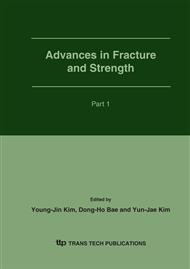p.1489
p.1495
p.1503
p.1510
p.1516
p.1522
p.1529
p.1534
p.1539
Influence of Material Composition on Mechanical Properties and Fracture Behavior of Ceramic-Metal Composites
Abstract:
In order to estimate distribution of mechanical properties and fracture toughness in ceramic-metal functionally graded materials (FGMs), mechanical properties and fracture behavior have been investigated on non-graded ceramics-metal composites which correspond to each region of FGMs. The materials are fabricated by powder metallurgy using partially stabilized zirconia (PSZ) and stainless steel (SUS 304). Vickers hardness, Young’s modulus and bending fracture strength were examined on smooth specimens. The Vickers hardness of the composites continuously decreases with an increase in a volume fraction of SUS 304 metal phase, while the Young’s modulus and fracture strength exhibit low values in the composites with balanced composition of each phase. This suggests that the interfacial strength between the ceramic and metal phases is very low. Fracture toughness tests are conducted by three-point-bending on rectangular specimens with a sharp edgenotch. In contrast with the Young’s modulus and fracture strength, the fracture toughness obtained for the composites increases with an increase in a volume fraction of SUS 304 metal phase. The fracture toughness of the composites is slightly lower than that obtained previously by stable crack growth in a PSZ-SUS 304 FGM. The difference in fracture toughness between the composites and FGM seems to be attributed to the residual stress created during fabrication of the FGM.
Info:
Periodical:
Pages:
1516-1521
Citation:
Online since:
November 2005
Authors:
Price:
Сopyright:
© 2005 Trans Tech Publications Ltd. All Rights Reserved
Share:
Citation:


